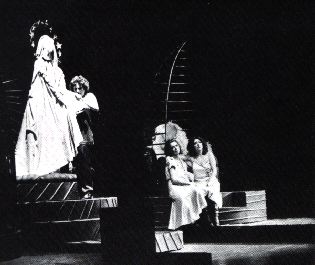Canadian Theatre Encyclopedia
Les Fées ont soif

Drama in one long act by Denise Boucher, with music by Jean-François Garneau, premiered at the Théâtre du Nouveau Monde, November 18, 1978, directed by Jean-Luc Bastien, with set and costumes by Marie-Josée Lanoix, lights by Claude Landré and featuring Sophie Clément, Michèle Magny and Louisette Dussault.
The play is an emotional outburst of frustration, pain and rage, interspersed with songs which lighten the mood. Three female stereotypes - a whore named Madeleine, a mother on valium named Marie, and a Statue of the Virgin Mary - all thirsty for liberation and self-realization -- speak their minds and denounce the representations of women served up by the patriarchy. Boucher presented this strong feminist work with no apologies: the Virgin asserts her sexuality, and throws away her rosary -- depicted as a repressive chain that has bound her for centuries; the housewife drops her heavy apron; the whore takes off her shiny boots. They enact a rape scene and a subsequent trial in which the victim is further victimized and the rapist is acquitted. Finally, the Statue proclaims that she has had enough, and a woman emerges from the stone carapace. The three women then invite the audience to imagine a world free of stereotypes and full of joy.
The play uses strong, colourful language, in order to dislodge social assumptions. The Virgin Mary calls herself "the priests' wet dreams . . . the tool of impotence." Marie, the housewife, expresses her boredom and her revolt against her mother's teachings of cleanliness, femininity, and purity. Madeleine describes a man's head as "just a garage where he parks his precious phallus." The three women consider themselves "political prisoners" within a patriarchy which determines the discourse of medicine, law, psychology, and popular culture.
An explosion of controversy accompanied the opening of the play. The Catholic archdiocese of Montreal denounced the work from every pulpit and congregations from throughout Montreal picketed the theatre and even bought blocks of tickets to recite the rosary while the play was being performed. Moreover, the arts council of the city of Montreal refused to subsidize the piece and a storm of protest about censorship ensued. Court cases - including an action to suppress the published play - were brought against the work until the Supreme Court refused to hear them in 1980.
The play was published by Éditions Intermédaire in 1978, and has since been performed around the world, including in an English translation, The Fairies are Thirsty by Alan Brown (Talonbooks, 1982). This translation is included in the Anthology of Québec Women's Plays in English Translation Vol I (1966-1986), edited by Louise H. Forsyth (Playwrights Canada Press, 2006).
Further reading: Elaine R. Hopkins, "Feminism and a Female Trinity in Denise Boucher's Les Fées ont soif," American Review of Canadian Studies 14.1 (1 March 1984):63–71.
Commentary by Gaetan Charlebois and Anne Nothof. Additional information from Marguerite Anderson, "Subversive Texts: Quebec Women Writers," Studies in Canadian Literature: 13.2 (1988).
Last updated 2011-01-26

